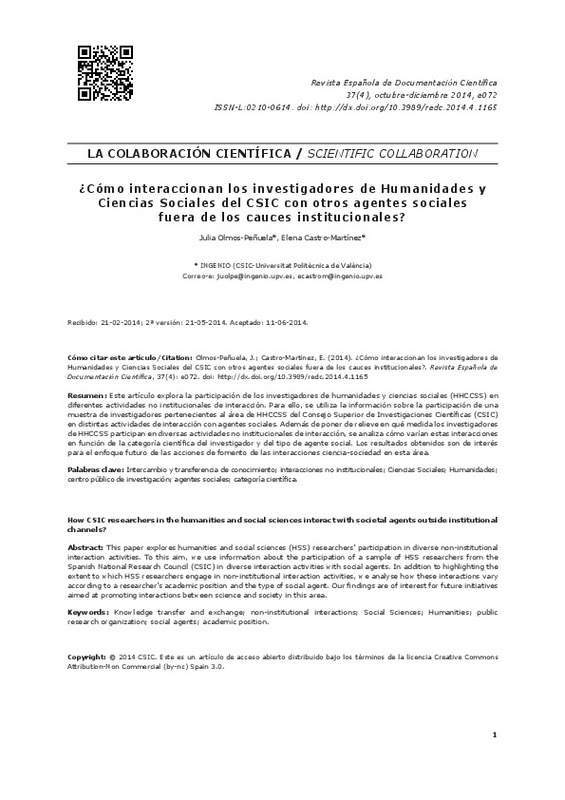Abreu, M., & Grinevich, V. (2013). The nature of academic entrepreneurship in the UK: Widening the focus on entrepreneurial activities. Research Policy, 42(2), 408-422. doi:10.1016/j.respol.2012.10.005
Abreu, M.; Grinevich, V.; Hughes, A.; Kitson, M. (2009). Knowledge exchange between academics and the business, public and third sectors. Cambridge: Centre for Business Research and UK-IRC.
Amara, N., Landry, R., & Halilem, N. (2012). Faculty consulting in natural sciences and engineering: between formal and informal knowledge transfer. Higher Education, 65(3), 359-384. doi:10.1007/s10734-012-9549-9
[+]
Abreu, M., & Grinevich, V. (2013). The nature of academic entrepreneurship in the UK: Widening the focus on entrepreneurial activities. Research Policy, 42(2), 408-422. doi:10.1016/j.respol.2012.10.005
Abreu, M.; Grinevich, V.; Hughes, A.; Kitson, M. (2009). Knowledge exchange between academics and the business, public and third sectors. Cambridge: Centre for Business Research and UK-IRC.
Amara, N., Landry, R., & Halilem, N. (2012). Faculty consulting in natural sciences and engineering: between formal and informal knowledge transfer. Higher Education, 65(3), 359-384. doi:10.1007/s10734-012-9549-9
Azagra-Caro, J. M. (2007). What type of faculty member interacts with what type of firm? Some reasons for the delocalisation of university–industry interaction. Technovation, 27(11), 704-715. doi:10.1016/j.technovation.2007.05.003
Baldini, N., Grimaldi, R., & Sobrero, M. (2007). To patent or not to patent? A survey of Italian inventors on motivations, incentives, and obstacles to university patenting. Scientometrics, 70(2), 333-354. doi:10.1007/s11192-007-0206-5
Bate, J. (editor) (2011) The public value of the humanities, London, Bloomsbury.
Craig Boardman, P., & Ponomariov, B. L. (2009). University researchers working with private companies. Technovation, 29(2), 142-153. doi:10.1016/j.technovation.2008.03.008
Bonaccorsi, A., & Piccaluga, A. (1994). A theoretical framework for the evaluation of university-industry relationships. R&D Management, 24(3), 229-247. doi:10.1111/j.1467-9310.1994.tb00876.x
British-Academy (2008). Punching our weight: the humanities and social sciences in public policy making. London: The British Academy.
Cohen, W. M., Nelson, R. R., & Walsh, J. P. (2002). Links and Impacts: The Influence of Public Research on Industrial R&D. Management Science, 48(1), 1-23. doi:10.1287/mnsc.48.1.1.14273
CSIC (2008). Memoria anual 2007. Madrid: CSIC.
CSIC (2012). Memoria anual 2011. Madrid: CSIC.
D’Este, P., & Patel, P. (2007). University–industry linkages in the UK: What are the factors underlying the variety of interactions with industry? Research Policy, 36(9), 1295-1313. doi:10.1016/j.respol.2007.05.002
D’Este, P., & Perkmann, M. (2010). Why do academics engage with industry? The entrepreneurial university and individual motivations. The Journal of Technology Transfer, 36(3), 316-339. doi:10.1007/s10961-010-9153-z
Göransson, B., Maharajh, R., & Schmoch, U. (2009). New activities of universities in transfer and extension: multiple requirements and manifold solutions. Science and Public Policy, 36(2), 157-164. doi:10.3152/030234209x406863
Grimpe, C., & Fier, H. (2009). Informal university technology transfer: a comparison between the United States and Germany. The Journal of Technology Transfer, 35(6), 637-650. doi:10.1007/s10961-009-9140-4
Hessels, L. K., van Lente, H., & Smits, R. (2009). In search of relevance: the changing contract between science and society. Science and Public Policy, 36(5), 387-401. doi:10.3152/030234209x442034
Hughes, A., & Kitson, M. (2012). Pathways to impact and the strategic role of universities: new evidence on the breadth and depth of university knowledge exchange in the UK and the factors constraining its development. Cambridge Journal of Economics, 36(3), 723-750. doi:10.1093/cje/bes017
Lam, A. (2011). What motivates academic scientists to engage in research commercialization: ‘Gold’, ‘ribbon’ or ‘puzzle’? Research Policy, 40(10), 1354-1368. doi:10.1016/j.respol.2011.09.002
Landry, R., Saïhi, M., Amara, N., & Ouimet, M. (2010). Evidence on how academics manage their portfolio of knowledge transfer activities. Research Policy, 39(10), 1387-1403. doi:10.1016/j.respol.2010.08.003
Lepori, B., Barré, R., & Filliatreau, G. (2008). New perspectives and challenges for the design and production of S&T indicators. Research Evaluation, 17(1), 33-44. doi:10.3152/095820208x291176
Link, A. N., Siegel, D. S., & Bozeman, B. (2007). An empirical analysis of the propensity of academics to engage in informal university technology transfer. Industrial and Corporate Change, 16(4), 641-655. doi:10.1093/icc/dtm020
Manjarrés-Henríquez, L., Gutiérrez-Gracia, A., Carrión-García, A., & Vega-Jurado, J. (2009). The Effects of University–Industry Relationships and Academic Research On Scientific Performance: Synergy or Substitution? Research in Higher Education, 50(8), 795-811. doi:10.1007/s11162-009-9142-y
Martin, B. (2003). The changing social contract for science and the evolution of the university. En: Geuna, A., Salter, A. J.; Steinmueller, W. E. (editores.) Science and Innovation: Rethinking the rationales for funding and governance. Edward Elgar, Cheltenhan, UK, pp. 7-29.
Meyer-Krahmer, F., & Schmoch, U. (1998). Science-based technologies: university–industry interactions in four fields. Research Policy, 27(8), 835-851. doi:10.1016/s0048-7333(98)00094-8
Molas-Gallart, J.;Salter, A.;Patel, P.;Scott, A.; Duran, X. (2002). Measuring third stream activities. Brighton: SPRU.
Murray, F. (2004). The role of academic inventors in entrepreneurial firms: sharing the laboratory life. Research Policy, 33(4), 643-659. doi:10.1016/j.respol.2004.01.013
O’Shea, R. P., Chugh, H., & Allen, T. J. (2007). Determinants and consequences of university spinoff activity: a conceptual framework. The Journal of Technology Transfer, 33(6), 653-666. doi:10.1007/s10961-007-9060-0
OECD (2002). Frascati Manual: Proposed Standard Practice for Surveys on Research and Experimental Development. Paris: OECD.
Olmos-Pe-uela, J.; Benneworth, P.; Castro-Martínez, E. (2013a). Are "STEM from Mars and SSH from Venus"? Challenging disciplinary stereotypes of research's social value. Science and Public Policy.
Olmos-Peñuela, J., Castro-Martínez, E., & D’Este, P. (2014). Knowledge transfer activities in social sciences and humanities: Explaining the interactions of research groups with non-academic agents. Research Policy, 43(4), 696-706. doi:10.1016/j.respol.2013.12.004
Olmos-Pe-uela, J.; Castro-Martínez, E.; Fernández-Esquinas, M. (2014b). Diferencias entre áreas científicas en las prácticas de divulgación de la investigación: un estudio empírico en el CSIC. Revista Espa-ola de Documentación Científica, vol. 42 (2).
Olmos-Pe-uela, J.; Molas-Gallart, J.; Castro-Martínez, E. (2013b). Informal collaborations between social sciences and humanities researchers and non-academic partners. Science and Public Policy.
Perkmann, M., Tartari, V., McKelvey, M., Autio, E., Broström, A., D’Este, P., … Sobrero, M. (2013). Academic engagement and commercialisation: A review of the literature on university–industry relations. Research Policy, 42(2), 423-442. doi:10.1016/j.respol.2012.09.007
Rothaermel, F. T., Agung, S. D., & Jiang, L. (2007). University entrepreneurship: a taxonomy of the literature. Industrial and Corporate Change, 16(4), 691-791. doi:10.1093/icc/dtm023
Schartinger, D., Rammer, C., Fischer, M. M., & Fröhlich, J. (2002). Knowledge interactions between universities and industry in Austria: sectoral patterns and determinants. Research Policy, 31(3), 303-328. doi:10.1016/s0048-7333(01)00111-1
Stephan, P. E. (1996). The economics of science. Journal of Economic literature, vol. 24 (3), 1199-1235.
[-]









